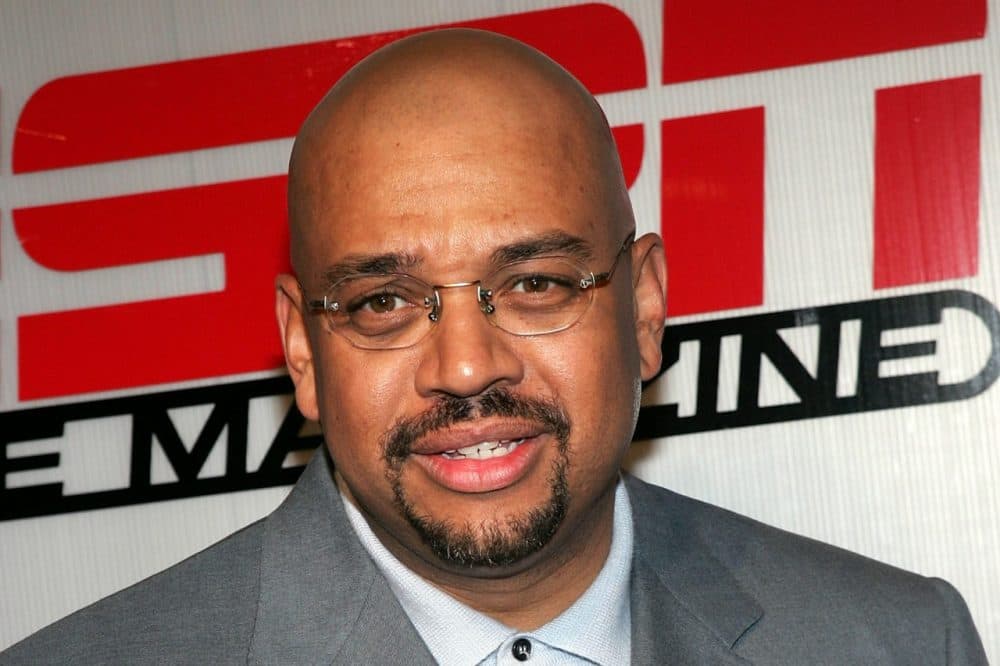Advertisement
ESPN’s Wilbon On NFL Slur Rule Proposal: 'Context Is Everything'
Resume
When the NFL’s competition committee meets next week, it will consider a proposal that would ban the use of racial epithets on the field. If NFL owners eventually approve the rule, teams would be hit with a 15-yard penalty when one of their players is flagged for using a slur during a game. The idea came from the Fritz Pollard Alliance, a group that supports African-American candidates for coaching and front-office jobs in the NFL.
Would such a rule be enforceable? Would all slurs be considered equally offensive and inappropriate?
Michael Wilbon co-hosts ESPN's "Pardon The Interruption." Wilbon is African-American and is one of the people opposed to the change. He joined Bill Littlefield on Only A Game to discuss his views.
BL: The committee reportedly considered a variety of slurs that might fall under this rule – including homophobic terms, but this policy seems to be aimed at players inclined to use the “N-word.” Please explain your objection to that.
MW: Well, it's complicated. It's very difficult, and it also includes an incredible arrogance and hypocrisy on the part of the NFL. But let's go back to something that you said in setting up this segment. Racial epithet. It's not a racial epithet when many black players use it with black players. And the NFL's about 70 percent black. So, when these players use it, as frankly I might use it, with friends or family members or colleagues or people that I know to use it, it's not a racial epithet — when I utter it to that person and not when uttered to me.
It's the history of this word and the heinous nature of the word is because it is used as a racial epithet. But context is everything and for me, and many of us, ownership of the word is important. Who uses it determines how you feel about it.
BL: Is the problem that nobody in a decision-making capacity could determine whether one player intended to insult another?
[sidebar title="More On The NFL's Proposed Policy" align="right"]OAG's Zoë Sobel has more on the NFL's proposed ban on racial slurs.[/sidebar]MW: That's a great point. You can't adjudicate an NFL game having to consider that every 30 seconds, which is about how often it is uttered on the NFL field down in the trenches on a Sunday or Monday night. How are officials standing two feet behind the line of scrimmage going to know exactly who uttered it?
The other problem I have is were talking about a league that allows a team to exist with the name Redskins is gonna penalize people — in the vast majority of cases black players — for using the N-word? While they have a team named Redskins in the league? So there's this great concern for language and offensive language. When is the league, specifically the commissioner, gonna address that? Because he hasn't.
BL: Your colleague at ESPN, Jason Whitlock, who is also African-American, is strongly in favor of this rule. In a column published this week, he wrote: “The N-word is the shackle on our brains. It controls how we see ourselves, and how we see ourselves determines our behavior.” What’s your response to that point of view?
MW: Jason very eloquently presents a convincing case and Jason I don't dismiss. We may be on the opposite side on the use of the word. He has stopped. I have not. And I got a problem with a league that has no black ownership and very few blacks at the top of the executive level making all of these decisions. I wanna know who that input comes from and it better be more than just the Fritz Pollard Alliance.
BL: Have you spoken with current players about how they feel about this?
MW: All the time.
BL: And how does it break down?
MW: I'd say the same way it breaks down in regular, as I call it, "black life." About 50-50. It really has no occupational, socioeconomic, or even educational component. There's celebrities, there are politicians, there are clergymen who use it — and don't. And journalists who use it — and those who don't.
BL: You know Michael, it strikes me as we talk about this, I've been told that the officials if they wanted to could call holding on every play. It strikes me from what you've said that they could call this 15-yard penalty on every play, too.
MW: Or some language Bill, yes. Are you going to ban profanity? If people are going to say, "We don't have the N-word in the workplace." We don't have profanity in most workplaces. You gonna ban that? What are you going to do about the word that usually proceeds "cat" that is uttered every other moment in the NFL, in the trenches, or on the NBA court, where coaches might even call a player that? What are you going to do about those words?
BL: Finally I'm going to ask you for a prediction Michael. Do you think it's likely the league will approve this proposal?
MW: I think it's unlikely. I think the league is going to have to deal with its hypocrisy and an increasing number of people pointing it out. I know the NFL's history of "flexing," if you will, Bill. This is a dangerous place to flex. The league is going to have to answer a lot of questions. Roger Goodell is going to have to answer a lot of questions, and I'm not sure they're prepared to do that.
This segment aired on March 1, 2014.